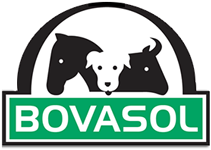What is Cryptosporidiosis?

Cryptosporidiosis (crypto) is a common parasitic disease of many neonatal mammals worldwide, commonly affecting calves, lambs, kids, piglets and foals, caused by the protozoan organism Cryptosporidium parvum. Crypto commonly affects calves from one to four weeks of age. The disease is characterised by profuse watery, mucoid and sometimes bloody diarrhoea with anorexia, followed by dehydration and sometimes death. Although usually self limiting, the diarrhoea may be persistent and resistant to therapy. Other symptoms include abdominal discomfort and mild fever.
Although mortality is usually fairly low, morbidity is high and calves that recover from crypto are often growth compromised due to permanent damage to the villi of the small intestine. Mortality is increased during a cold spell, or when crypto is allowed to take hold in combination with bacterial or viral challenge, or where a milk reduction protocol for scouring calves is followed.
Oocysts of cryptosporidium will be shed in the faeces for the duration of the diarrhoea and may persist for several days after the clinical symptoms have abated. Calf to calf transmission via faeces contamination of food or water, as well as vector transmission (flies, rodents) onto food or water sources is common during this time. Since oocyst shedding can begin as early as two days of age, it implies very early neonatal susceptibility to the organism. Calves can shed up to 1 000 000 oocysts per gram of faeces, with the ingestion of as few as 10 oocysts capable of causing infection in susceptible calves. Adult animals, although asymptomatic, have been shown to shedoocysts therefore acting as a reservoir for the infection of her calf.
Oocysts can survive in the environment for a long time due to their thick protective cell wall, and have been known to survive between temperatures of -20C and 60C, and can remain viable for more than 12 months if the right conditions of temperature and humidity are present. They are also particularly resistant to disinfection.
Each oocyst contains four infective sporozoites, which invade the cells of the gut lining primarily in the small intestine. The parasite multiplies rapidly in the cells before breaking back into the gut lumen, causing considerable damage to the epithelial lining in the process. Sporulated oocysts will be excreted in the faeces and be infectious to other animals on ingestion.
High stocking densities and synchronised calving practices favour rapid parasite multiplication and infection rates.
Treatment and Control
Treatment consists of isolating infected animals and providing rehydration therapy to combat dehydration. Milk should preferably not be withdrawn from the infected calves as this seems to increase mortality rates. Antibiotics to control secondary bacterial infections may be given on the advice of a veterinarian.
As with most diseases, prevention should be the preferred strategy. The value of good quality colostrum ingested within the first few hours of life cannot be underestimated. Prevention should be aimed at reducing the exposure of susceptible animals to the oocysts. Infected animals should be isolated and clean bedding provided for all animals. Faecal food and water contamination should be minimised and calf pens should be thoroughly disinfected with products with known activity against oocysts. Since calves can be infected very early in life, hygiene in the calving facilities is important. Avoid spreading contaminated, uncomposted manure or slurry onto pastures as this will also act as a reservoir for infection and may seep into water sources.
The ionophore lasalocid is showing promise in preventing clinical manifestations of the disease, although care must be taken with the dosage because of potential toxicity concerns. SupaCalf is a convenient source of lasalocid in a liquid medium specifically formulated for milk fed calves. Initial anecdotal evidence suggests that SupaCalf, when correctly dosed, provides effective prevention of clinical cryptosporidiosis. Contact us or consult your veterinarian for advice on effective dosage levels.
Economic importance
Protozoal diseases are difficult to treat as they often do not respond to conventional antibiotic therapy, and there are no effective vaccines currently available. Hydration therapy and preferably isolation is important in controlling the disease. The additional labour requirement as well as the cost of hydration therapy is significant. Calves that recover from scours are also often more susceptible to other diseases, and calves that have had crypto generally have a lower growth rate, and therefore will take longer to reach breeding targets, and reduced lifetime performance. This is the real cost of cryptosporidiosis.
SupaCalf at recommended dosage has been shown to be effective in increasing feed efficiency and live weight gain.
Considerations in human health
C. parvum is not host-specific and so can also affect humans. As with calves, neonates are most susceptible, but any condition resulting in a compromised immune system may facilitate susceptibility in humans. In such cases, infection with Cryptosporidium spp may cause severe, chronic and potentially fatal diarrhoea. It is advisable to account for these potentialities when appointing, and planning ablution facilities for calf rearing staff.
